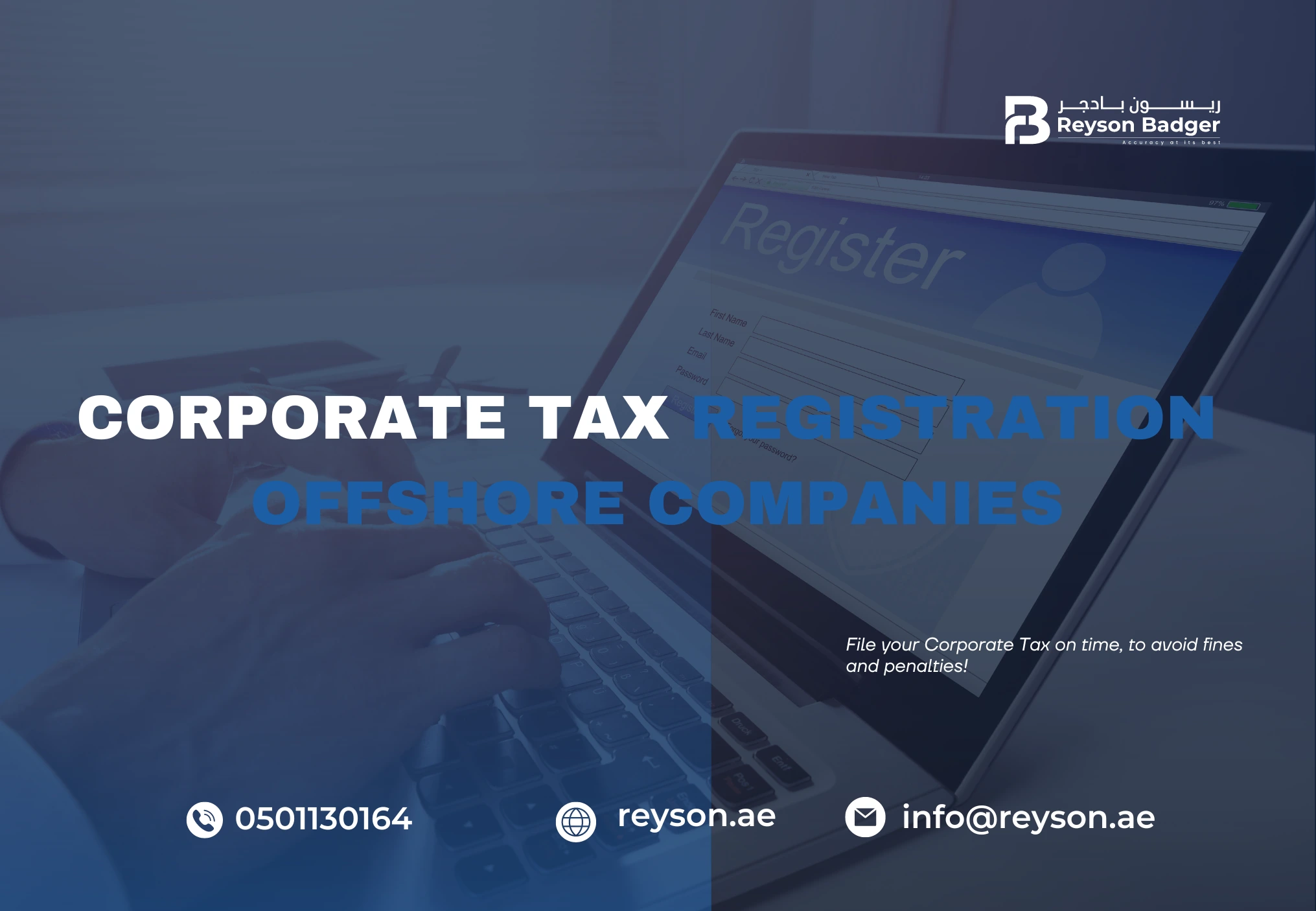
The UAE has established itself as one of the world’s leading business hubs, providing a favorable environment for international companies looking to expand their business. Recently, the UAE corporate tax system made corporate tax registration mandatory for all companies that offshore companies include. It is also to ensure this. For offshore businesses, filing corporate taxes is more than just compliance; It’s also about finding important benefits that can strengthen your company.

Corporate tax is a direct tax applied to the profits or income generated by companies operating in the UAE. While tax rates remain competitive compared to many other global markets, companies need to remain compliant by registering and filing taxes as required. The UAE is home to them. Failure to comply may result in fines, penalties, and legal consequences, making it imperative that offshore businesses follow proper registration procedures If setting up an offshore company in the UAE is a practice it is strategically available to international businesses looking to increase global scale while reducing operating costs Offshore companies allow businesses to operate with fewer restrictions, delivering benefits such as any restrictions that apply of foreign ownership, access to global markets and asset protection This program is particularly attractive to companies seeking confidentiality, flexibility and tax efficiency. However, the introduction of corporate tax means that offshore companies must now take proactive steps to ensure full compliance while still reaping the benefits of being based in the UAE.
Offshore corporate tax registration entails forming a business in an offshore location that, usually, promises attractive tax advantages with low reporting requirements and increased financial confidentiality. Offshore Corporate Tax registration allows businesses the legal opportunity to operate their businesses outside their home country while enjoying the financial benefits afforded them by the offshore jurisdiction.
Offshore companies in the UAE have been in much demand lately due to strategic benefits offered by them, which are mainly in the form of tax benefits, confidentiality, and protection of assets.
Definition and Purpose of Offshore Companies
An offshore company is legally structured in a jurisdiction other than its site of incorporation, mainly intended to operate outside the national market rather than in it. The UAE provides various aims for offshore companies. For asset protection, among others, these entities act as a protective cover for personal and business assets against any potential creditors and claims.
Offshore companies in the UAE fall under a body of federal laws and specific regulations for certain jurisdictions. Some of the main features include:
Each jurisdiction has its rules governing the formation, management, and operational guidelines of offshore companies. For instance, RAK ICC ensures that a client can have 100% ownership without any local partners, whereas JAFZA has advantages like the right to property in the State of Dubai.
Understanding the distinctions between offshore, free zone, and mainland companies is crucial for entrepreneurs considering business setup in the UAE:
| Feature | Offshore Companies | Free Zone Companies | Mainland Companies |
| Business Activities | Cannot conduct business within UAE; focus on international operations | Is able to conduct business within the free zone and internationally | Can operate anywhere in the UAE and internationally |
| Ownership Structure | 100% foreign ownership; no local sponsor required | 100% foreign ownership; no local sponsor required | Requires a local sponsor (UAE national) holding at least 51% ownership |
| Physical Presence | No physical office is allowed in the UAE | Must have an office within the free zone | Must have a physical office within the UAE |
| Taxation | Exempt from corporate tax | Exempt from corporate tax | Subject to corporate tax regulations |
| Licensing | Limited to specific activities; cannot obtain trade licenses for local business | Can obtain trade licenses for activities allowed within the free zone | Can obtain all necessary trade licenses for operating in the UAE |
In summary, offshore companies in the UAE are designed for international operations with significant benefits such as asset protection and tax efficiency. They operate under a well-defined legal framework that facilitates secure and confidential business practices. Understanding the distinctions between free zones and mainland companies is essential for making informed decisions regarding business establishment in the region.
|
Aspect |
Onshore Tax Registration |
Offshore Tax Registration |
|---|---|---|
|
Business Activity |
Operates within the UAE market
|
Operates out of the UAE market. |
|
Tax Obligations |
Affected by corporate income tax accrued in UAE. |
Typically exempt from local corporate taxes. |
|
Regulation |
Determined by mainland laws and regulations. |
Governing by offshore-specific rules. |
|
Purpose |
Local trading, manufacturing, or delivery of services. |
Protection of assets, tax planning, and secrecy. |
|
Physical Presence |
Requires a physical office and employees. |
No requirement for a physical office or employees. |
|
Disclosure |
Higher transparency and reporting requirements. |
Confidentiality and privacy for the financial. |
Offshore jurisdictions form a vital part of tax planning everywhere around the globe. They have the following benefits to businesses:
Limited Scope for Some Business Activities
Regulatory Updates
Banking and Financial Challenges
How Offshore Corporate Tax Registration Enhances Business Operations
Simplifying Global Transactions and Operations
Reducing Tax Liability for Multinational Companies
Attracting International Investors and Clients
Jebel Ali Free Zone (JAFZA Offshore)
Ras Al Khaimah (RAK) Offshore
Ajman Offshore
The introduction of corporate tax rules for the United Arab Emirates (UAE) is a landmark change within the Emirates' fiscal framework.
Corporate Tax Laws Applied to Offshore Corporations in the UAE
The corporate tax regime of the UAE is governed by Federal Decree-Law No. (47) of 2022 dated December 9, 2022. Federal Decree-Law No. (47) of 2022 stipulates that a federal corporate tax will be applicable to the financial years beginning on or after June 1, 2023. Features of this tax regime are:
Tax Rates: The headline corporate tax rate is 9% on taxable income over AED 375,000. Profits below this limit are taxed at 0%. Some big multinational enterprises are liable to a higher rate of 15%, as well as for example to meet international standards set by the OECD.
Scope of Taxation: Corporate tax subjects the following corporate structures to taxation:
Exemptions: Certain entities are not subject to corporate tax. Examples include government entities, qualifying investment funds, and extractive industry businesses. Free zone companies may be exempted if they meet predetermined requirements.
All UAE-based businesses, including offshore businesses, will have to register with regard to corporate tax even though they may be exempt from paying tax. Registration, for example, becomes a prerequisite for compliance and is based on a tax registration application submitted to the FTA. The offshore businesses that lack the criteria for exemption will comply with corporate tax rules.
Qualifying for Relief The offshore companies qualify for the 0% corporate tax rates if they meet specific conditions, such as having sufficient substance in the UAE and producing qualifying income.
The deadlines for registration and compliance for offshore companies are strictly time-barred:
Offshore companies operating in the UAE have to find a way through the new corporate tax compliances requiring registration and to be skilled at balancing according to deadlines to abide by further compliance. The understanding of these laws would enable the operation to complete integrity and avoid possible penalties in case of non-compliance.
Step-by-step guide to the registration of an offshore company
The process of Offshore Corporate Tax Registration in the UAE involves several critical steps to ensure compliance with local tax laws and regulations. This registration is particularly significant for businesses that want to operate outside their home jurisdiction while benefiting from the UAE's favorable tax environment. Here’s a detailed breakdown of the registration process:
Step 1: Access the EmaraTax Portal
Step 2: Add Taxable Person Details
Step 3: Open the Corporate Tax Dashboard
Step 4: Begin the Registration Process
Step 5: Fill Out the Entity Section
Step 6: Complete the Identification Section
Step 7: Input Contact Details
Step 8: Fill in Authorized Signatory Information
Step 9: Review Your Application
Step 10: Submit Your Application
Step 11: Await Approval
Following this step-by-step guide will help ensure a smooth process of Offshore Corporate Tax Registration in the UAE. Ensure that you have all the necessary documents and information ready before you begin to make the process more efficient. If you encounter any issues, consider consulting with a tax expert or advisor to assist you with your corporate tax registration.
Corporate tax registration for offshore companies in the UAE offers many benefits to businesses that want to optimize the management of their finances. Some of the obvious advantages are as follows:
The offshore corporate tax registration in the UAE would provide financial, operational, and strategic benefits that will greatly help improve company performance within the international marketplace.
According to Cabinet Decision No. 10 of 2024, businesses failing to comply with mandatory corporate tax registration requirements in the UAE will be subject to a penalty of AED 10,000. This penalty has been enforced by the Ministry of Finance starting from March 1, 2024, with no extensions on registration deadlines. Businesses are urged to ensure timely registration to avoid fines and maintain compliance.
In conclusion, Undoubtedly, the registration process for an offshore corporation tax is very complicated. As such, it should be undertaken cautiously and expert assistance is necessary. Even so, experts, such as experienced consultants, may ensure full compliance with local requirements, optimize tax structures, and reduce possible risks in the registration procedure.
Understanding that each client has a unique requirement calling for specialist service to fulfill offshore tax registration, we at Reyson Badger engage businesses in more core operations while leaving compliance and, indeed, tax optimization to us as a result of leverage expertise. We therefore give our advice and support to companies that wish to create or expand their presence offshore. Together, we shall build the way towards a prosperous and compliant offshore venture.